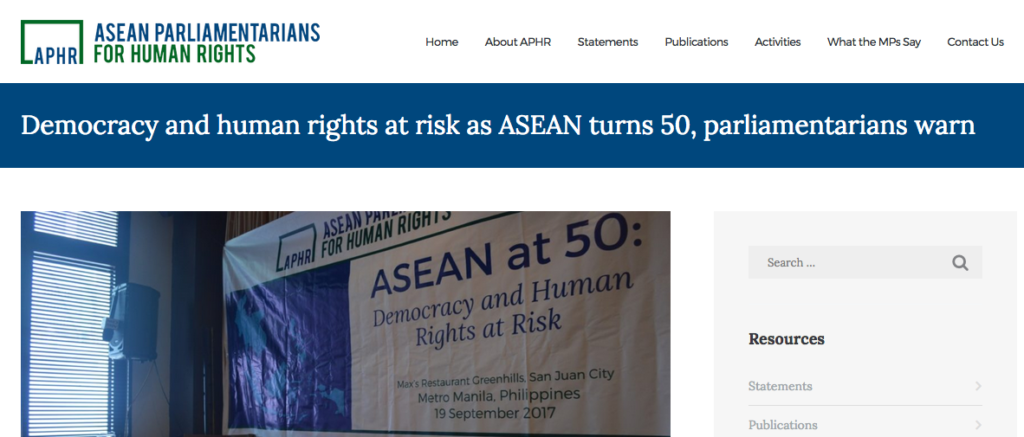19 Sep 2017
Integration or disIntegration: Democracy and human rights at risk as ASEAN turns 50, parliamentarians warn
MANILA, 19 September 2017, APHR media release — As the Association of Southeast Asian Nations (ASEAN) celebrates its 50th year of existence, the region faces a human rights crisis and the future of democracy is at risk, ASEAN Parliamentarians for Human Rights (APHR) said today.
Speaking at a press conference in Manila, lawmakers from Malaysia and the Philippines – representing an independent network of parliamentarians from across the ASEAN region – highlighted the widening scope of democratic erosion and the deterioration of rights protections in multiple countries, reiterating previous calls to free political prisoners, tackle rights abuses, and strengthen democratic institutions.

“Look at the political situation in countries across the region: an unprecedented assault on the opposition and civil society in Cambodia; a military government in Thailand that shows no signs of relinquishing power; a genocide unfolding unabated in Myanmar. Meanwhile, here in the Philippines, the rule of law and accountability appear to have been thrown out the window completely in the context of the government’s ongoing drug war,” said APHR Chairperson Charles Santiago, a member of the Malaysian Parliament.
“We are facing an epidemic of backsliding in country after country, and ASEAN simply sits by and watches. What does this say about ASEAN’s potential – after 50 years – to promote positive change? Have we really grown into the caring and sharing community that ASEAN leaders always talk about?”
“We are witnessing a race to the bottom in the ASEAN region, and it seems to be accelerating day by day,” added Tom Villarin, an APHR member and member of the House of Representatives of the Philippines. “Longtime authoritarian states are seeing those systems become further entrenched, while countries that were once advancing, have moved into reverse.”
“Even institutions intended to promote accountability are being weaponized to harass opposition and bolster authoritarianism,” added fellow Philippine Congressman Teddy Baguilat, an APHR Board Member, noting that, in many cases, parliaments themselves have been a part of the problem, failing to promote and protect human rights and safeguard their independence and democratic functions.
“Legislatures, including ours here in the Philippines, are using their powers to undermine institutions critical to the protection of rights, cutting funding from the likes of the Commission on Human Rights and the National Commission on Indigenous Peoples,” he said.
MPs noted similarities between the assault on democracy and rights in multiple countries, highlighting, in particular, a trend of attacks on elected lawmakers.
“The regional patterns are clear, and parliamentarians, themselves, are increasingly victims. Kem Sokha in Cambodia, Anwar Ibrahim in Malaysia, Leila De Lima in the Philippines – the parallels are striking. Governments are going after the opposition with a vengeance, and they seem to be learning from one another in terms of how to go about it,” MP Charles Santiago said.
Later today, in Manila, parliamentarians are scheduled to visit Senator Leila De Lima, a chief critic of President Rodrigo Duterte, who has been in prison since February of this year on politically motivated drug trafficking charges. APHR reiterated its call for her immediate and unconditional release, as well as the release of other prominent opposition figures elsewhere in Southeast Asia: Kem Sokha, the leader of the main opposition party in Cambodia, who was arrested on trumped-up treason charges on 3 September, and Anwar Ibrahim, former leader of the opposition in Malaysia, who has been in jail since February 2015.
In the context of these developments, ASEAN needs to reexamine its role and approach, parliamentarians argued, including its emphasis on economic aspects of integration and its non-interference principle.
“ASEAN is progressing toward an increasingly integrated regional community, but the discussions have focused disproportionately on trade and economics, ignoring critical issues of governance, human rights, and environmental protection,” said Tian Chua, an APHR member and Malaysian MP.
“Governments have decided they can simply pick and choose which elements of the ASEAN Charter they must abide by. They like the non-interference principle, believing it shields them from criticism, and they don’t mind violations of their sovereignty in the economic realm. But they ignore clauses in the Charter that mandate elections and respect for human rights,” he added.
“As Chair of ASEAN in 2017, the Philippines is setting a particularly poor example. President Duterte has repeatedly undermined the rule of law, checks and balances, and democratic processes,” Rep. Tom Villarin said.
“After years as a regional leader in terms of democracy and human rights, the Philippines is now moving decisively in the wrong direction, sending a dangerous signal to other regional governments. Given this situation, we need to work together to push back against creeping authoritarianism here in the Philippines and across Southeast Asia.”
Parliamentarians argued that solutions lie in efforts to strengthen core democratic institutions, as well as in the promotion of broad-based social movements for democratic change and accountability.
“In many cases, our institutions are broken. Parliaments don’t respond to the needs of the people, and political parties are captured by elites and fail to promote policies that strengthen democracy and guard against human rights abuses. We need to break the cycle and work to regain public trust and strengthen accountability mechanisms,” MP Tian Chua said.
“We also need to refocus on building movements in support of human rights and democratic ideals. We need to empower and support civil society. That is our best hope of pushing back against the rising tide of authoritarianism region-wide,” Rep. Teddy Baguilat said.
